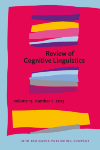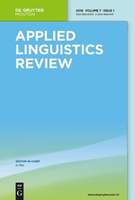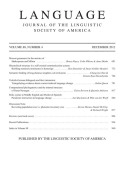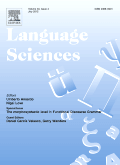
MUTTERSPRACHE
Scope & Guideline
Unveiling the Nuances of German and Beyond
Introduction
Aims and Scopes
- Applied Linguistics:
The journal emphasizes the application of linguistic theories to real-world contexts, particularly in professional and educational settings, such as business communication and medical discourse. - Cultural and Intercultural Studies:
It explores the interplay between language and culture, highlighting issues of intercultural competence and the role of language in shaping cultural identities. - Language Change and Variation:
The journal investigates historical and contemporary changes in the German language, including dialectal variations and the impact of societal changes on language use. - Language and Politics:
It examines the relationship between language and political discourse, discussing how language shapes public opinion and political identity. - Digital Communication:
The journal addresses the effects of digitalization on language practices, including how social media influences language use and communication styles. - Language Didactics:
It focuses on pedagogical approaches to teaching German as a foreign language, including strategies for enhancing language acquisition and proficiency. - Linguistic Purism and Gender:
The journal discusses contemporary debates around language purity and the evolution of gender-inclusive language forms in German.
Trending and Emerging
- Digital Linguistics:
Papers focusing on the intersection of language and digital media are increasingly prevalent, highlighting the need to understand language changes in online contexts. - Interdisciplinary Approaches:
There is a growing trend towards interdisciplinary research, integrating insights from fields such as sociology, psychology, and cultural studies to enrich linguistic analysis. - Language and Identity:
Emerging themes related to identity, including gender identity and multicultural influences, are becoming more prominent, reflecting societal changes and the importance of inclusive language. - Language and Mental Health:
Recent publications have started to address the role of language in mental health contexts, exploring how linguistic choices can impact patient experiences and communication. - Conspiracy Theories and Language:
The exploration of language in the context of conspiracy theories is a new and relevant theme, reflecting current global events and the role of language in shaping public discourse.
Declining or Waning
- Historical Linguistics:
There has been a noticeable decline in papers focusing on historical linguistics and the study of older forms of the German language, suggesting a shift towards contemporary issues. - Traditional Dialect Studies:
Research centered on traditional dialects appears to be waning, possibly due to a growing focus on broader sociolinguistic issues and the impact of globalization on language. - Linguistic Criticism:
Themes surrounding linguistic criticism and prescriptive norms are less frequently addressed, indicating a potential move towards more descriptive and inclusive approaches to language.
Similar Journals

Languages
Exploring the rich tapestry of language and its applications.Languages, published by MDPI, is a prestigious open-access journal dedicated to the field of Linguistics and Language studies. Since its inception in 2016, this journal has rapidly established itself as a leading platform for high-quality research, achieving an impressive Q1 ranking in 2023 and standing out in both the Arts and Humanities as well as the Social Sciences categories with significant percentile rankings (76th and 74th respectively). Based in Switzerland, Languages fosters an international community of scholars who are committed to exploring the multifaceted dimensions of language, from theoretical frameworks to practical applications. With a robust e-ISSN of 2226-471X, the journal prioritizes accessibility, allowing researchers, professionals, and students to freely engage with cutting-edge research and insights. By bridging the gap between theory and practice, Languages plays a crucial role in advancing our understanding of linguistic phenomena, making it an invaluable resource for anyone invested in the study of language.

Language and Linguistics Compass
Navigating the Complexities of Language and CommunicationLanguage and Linguistics Compass, published by Wiley, stands as a premier journal in the field of linguistics, showcasing innovative and interdisciplinary research. With its ISSN 1749-818X and E-ISSN matching, the journal has built a robust reputation, achieving an impressive Q1 ranking within the linguistics category for 2023, placing it in the top 4% of its field. Its Scopus rank of 48 out of 1167 highlights its influence and significance among linguistics journals, boasting a commendable 95th percentile. This journal serves as a vital resource for researchers, professionals, and students, offering a wide range of accessible articles that illuminate current trends and advances within the domain of language studies. Although it is not Open Access, the journal is committed to quality and diversity in its publications, ensuring scholarly articles from various sub-disciplines of linguistics are represented from 2008 through 2024. Located in the United Kingdom, Language and Linguistics Compass invites contributions from around the globe, reinforcing its status as a leading forum for linguistic discourse.

Iberica
Igniting collaboration in the world of language studies.Iberica, an esteemed journal published by AELFE, serves as a vital platform for scholarly discourse in the fields of linguistics and language studies. With its inception as an Open Access publication in 1999, Iberica has democratized access to high-quality research, fostering an environment of collaboration and innovation among researchers and professionals alike. Based in Spain at UNIV JAUME I, the journal has witnessed a remarkable ascent in the 2023 category quartiles, achieving a Q1 ranking in Linguistics and Language. Furthermore, its impressive Scopus rankings place it in the top 25% within both the Arts and Humanities and Social Sciences disciplines. Covering a diverse range of topics from theoretical linguistics to applied language studies, Iberica offers a compelling opportunity for academics seeking to contribute to and engage with contemporary issues in the linguistic landscape. As it converges in its publishing years from 2008 to 2024, it continues to set the standard for excellence within its field, making it an essential resource for students, researchers, and language professionals.

Yazyk i Kultura-Language and Culture
Unraveling Linguistic Threads in Cultural TapestriesYazyk i Kultura - Language and Culture is a distinguished academic journal dedicated to the exploration of linguistic and cultural issues across various contexts. Published by TOMSK STATE UNIVERSITY, this journal serves as a vital resource for researchers, scholars, and students interested in the intricate interplay between language and culture. With an ISSN of 1999-6195 and an E-ISSN of 2311-3235, it engages a global community in disseminating high-quality research articles, reviews, and theoretical discussions. Although the journal is not categorized as Open Access, it ensures that its contents contribute significantly to the academic discourse within the fields of linguistics, cultural studies, and social sciences. With a commitment to promoting scholarly research, Yazyk i Kultura is positioned to shape contemporary conversations about language's role in cultural dynamics, making it an essential outlet for those dedicated to advancing understanding in this interdisciplinary domain.

Review of Cognitive Linguistics
Advancing Insights in Cognitive LinguisticsThe Review of Cognitive Linguistics, published by John Benjamins Publishing Co, is a premier academic journal dedicated to the exploration of cognitive approaches to linguistics. With an ISSN of 1877-9751 and E-ISSN 1877-976X, this journal provides a critical platform for researchers and professionals to disseminate their findings in the rapidly evolving fields of linguistics and language, alongside developmental and educational psychology. Hailing from the Netherlands, the journal boasts impressive standing within the academic community, as indicated by its 2023 Q1 ranking in Linguistics and Language and Q3 in Developmental and Educational Psychology. Additionally, its Scopus rankings reflect a strong position within the arts and humanities and social sciences categories. While currently operating under a traditional access model, this journal actively contributes to the overarching discourse within cognitive linguistics, and is a vital resource for those aiming to deepen their understanding of the intricate link between language and cognition. Researchers, educators, and students are encouraged to engage with the rich body of articles spanning its convergence years from 2010 to 2024, making it an essential read for those at the forefront of these interdisciplinary studies.

Applied Linguistics Review
Elevating understanding of linguistic principles worldwide.Applied Linguistics Review is a leading academic journal published by WALTER DE GRUYTER GMBH, focusing on the dynamic field of linguistics and language studies. With an impressive Q1 quartile ranking in both Linguistics and Language and Social Sciences, the journal positions itself at the forefront of research, making it a crucial resource for scholars and professionals alike. The journal aims to foster scholarly dialogue by publishing high-quality, peer-reviewed articles that explore theoretical frameworks, empirical studies, and innovative methodologies in applied linguistics. Operating from Poland with an international reach, it is committed to advancing knowledge in areas such as language acquisition, language policy, and multilingualism. Its notable performance can be seen in its Scopus rankings, where it stands at #72 out of 1088 in the Arts and Humanities category and #86 out of 1167 in Social Sciences. The Applied Linguistics Review serves as an invaluable platform for researchers, educators, and students to disseminate and engage with cutting-edge research, thereby enhancing their understanding and application of linguistic principles in diverse contexts.

LANGUAGE
Charting New Territories in Linguistic TheoryLANGUAGE, published by the Linguistic Society of America, is a premier academic journal dedicated to the rigorous study of linguistic theory and practice. With an ISSN of 0097-8507 and E-ISSN 1535-0665, this esteemed journal has established itself as a leading publication in the field of linguistics since its inception. The journal has consistently maintained a high impact factor, being ranked in the Q1 category in Linguistics and Language for 2023, placing it among the top tier of academic journals. Notably, it also holds impressive Scopus rankings, being positioned at #75 out of 1088 in Arts and Humanities, and #89 out of 1167 in Social Sciences, demonstrating a significant impact and reach in the discipline. While it is not an open-access journal, LANGUAGE provides crucial insights into linguistic research, fostering a vibrant academic community. Spanning years from 1996 to 2024, it continues to be an essential resource for researchers, professionals, and students alike, aiming to advance the understanding of language in its myriad forms and functions.

Glossa-A Journal of General Linguistics
Exploring the Frontiers of Linguistic KnowledgeGlossa: A Journal of General Linguistics, published by the Open Library of Humanities, stands as a leading voice in the realm of linguistic research since its inception in 2016. With its Q1 category ranking in Linguistics and Language and impressive Scopus ranks encompassing the top 83rd and 81st percentiles in its respective fields, Glossa fosters a vibrant academic community committed to the rigorous exploration of language and linguistic theory. Operating under an open access model, the journal not only enhances the visibility of groundbreaking research but also ensures that valuable insights are accessible to a global audience. The journal's commitment to interdisciplinary dialogue makes it an indispensable resource for scholars, professionals, and students eager to engage with contemporary developments in linguistics. As it converges into 2024, Glossa continues to champion innovative scholarship and critical discourse that challenges conventional boundaries within the field.

Journal of Research in Applied Linguistics
Transforming Language Education and SociolinguisticsJournal of Research in Applied Linguistics is an esteemed academic journal published by Shahid Chamran University Ahvaz, Iran, focusing on the dynamic field of linguistics and language studies. With an ISSN of 2345-3303 and an E-ISSN of 2588-3887, the journal has established itself as a valuable resource for researchers and professionals aiming to explore diverse issues related to applied linguistics, including language acquisition, pedagogy, and sociolinguistic interactions. As part of a robust academic community since its inception in 2017, it is recognized with a Q2 quartile ranking in the world of linguistics and achieved impressive Scopus ranks reflective of its growing impact, particularly within the arts and humanities. The journal embraces an open access policy, enhancing its reach and availability to a broad audience. Researchers, educators, and students alike will find in the Journal of Research in Applied Linguistics a critical platform for dialogue, innovation, and contribution to the evolving landscape of language research.

LANGUAGE SCIENCES
Connecting Scholars Through Language ExplorationLANGUAGE SCIENCES, published by Elsevier Science Ltd, stands as a prominent journal in the field of linguistics and language studies. With an impressive impact factor that solidifies its reputation, it holds a Q1 ranking in both the linguistics and language categories for 2023, reflecting its excellence and relevance in cutting-edge research. Since its inception in 1979, this journal has evolved to encompass a wide range of interdisciplinary studies, providing a platform for innovative research that addresses the complexities of language use, acquisition, cognition, and social interactions. The journal is hosted in the United Kingdom and features rigorous peer-reviewed articles that contribute significantly to both the academic community and practical applications in language-related fields. With access options tailored for a diverse range of readers and contributors, LANGUAGE SCIENCES invites scholars, students, and professionals to engage with its comprehensive body of work and contribute to the ongoing discourse in linguistics.